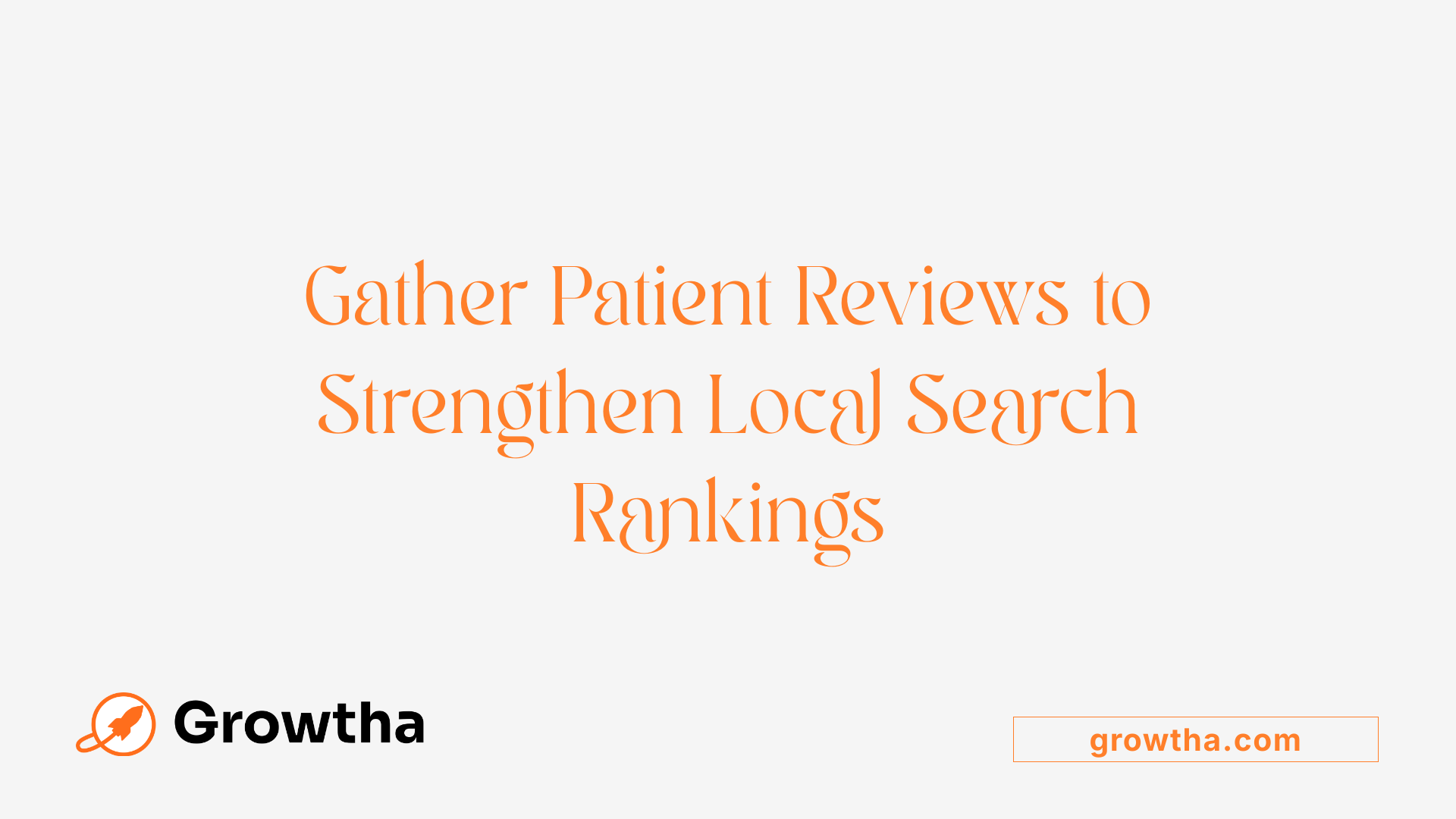How to Use Social Media to Support SEO for Clinics
Enhancing Healthcare Visibility: Integrating Social Media and SEO


How to Use Social Media to Support SEO for Clinics
Unlocking the Power of Social Media for Healthcare SEO
In today's digital age, healthcare clinics must leverage every available platform to improve their online presence. Social media isn't just about engagement anymore; it's a critical component of SEO strategy. This article explores how clinics can effectively utilize social media to support their SEO efforts, increase visibility, attract new patients, and establish their brand authority in a competitive healthcare landscape.
Building a Strong Social Media Foundation for Healthcare Clinics

Creating profiles on relevant platforms
Start by establishing and maintaining active profiles on social media sites where your target patients are most engaged. Platforms like Facebook, Instagram, LinkedIn, TikTok, and YouTube are essential for healthcare practices. Each platform allows sharing different types of content such as patient success stories, educational articles, and clinic updates.
Make sure these profiles include complete and accurate NAP (Name, Address, Phone number) details. Use relevant local keywords and hashtags that your community searches for. Keep your profiles visually appealing with high-quality images of your team and clinic to humanize your practice.
Using local hashtags and keywords
Incorporate location-specific hashtags and keywords into your social media content to increase visibility within your local area. This helps your posts appear in searches for nearby healthcare providers and in local discovery feeds.
Applying hashtags like #YourCityHealth, #YourTownUrgentCare, or #LocalVetClinic can connect your posts to a wider local audience. Use keywords related to your services within your posts, captions, and profile descriptions to boost search relevance.
Linking social profiles to your website
Ensure your social media accounts are connected to your official website. Include links in your profiles that direct followers to your site—preferably your homepage or specific landing pages focused on your services.
Active and consistent linking from your profiles to your website not only increases traffic but also signals trustworthiness to search engines. Make sure your website is optimized for mobile use, fast loading, and contains valuable content that addresses patient needs.
Integrating these strategies creates a cohesive online identity. A strong social media presence supports broader SEO efforts by enhancing brand recognition, building trust, and encouraging patient interactions.
| Strategy | Details | Impact |
|---|---|---|
| Profile Creation | Set up and optimize on relevant platforms | Increases visibility and brand consistency |
| Local Hashtags & Keywords | Use location-specific tags and words | Boosts local search discoverability |
| Profile & Website Linking | Connect social profiles to website | Drives traffic and signals authority |
| Content & Engagement | Share educational and humanizing content | Enhances reputation and patient trust |
The Symbiotic Relationship Between Social Media and Healthcare SEO

How does social media support SEO in healthcare?
Social media plays a crucial role in enhancing healthcare SEO efforts by increasing online visibility and attracting targeted traffic to medical websites. When healthcare providers share engaging, relevant content such as educational articles, success stories, and health tips, they position themselves as trusted authorities. This content, when optimized with appropriate keywords and hashtags, helps improve search engine rankings.
Profiles on platforms like Facebook, Instagram, and LinkedIn can be optimized with relevant keywords, location tags, and consistent branding to ensure they are easily discoverable in search results. Additionally, linking social media accounts back to the healthcare practice’s website creates a network of signals that search engines interpret as authority and relevance.
Encouraging patients to leave reviews on platforms like Google My Business boosts credibility and improves local SEO rankings. Responding professionally to reviews fosters trust and engagement. Overall, a strategic social media presence not only broadens patient reach but also aligns with broader SEO initiatives, resulting in higher search rankings and a stronger online reputation.
Role of social media signals in search rankings
Search engines consider social media signals—such as shares, likes, comments, and backlinks from social platforms—as indicators of content relevance and popularity. For healthcare practices, increased engagement on social media signals to search engines that the content is useful and trustworthy.
Platforms that frequently appear in search results further enhance visibility. When healthcare providers actively post educational content, updates, and patient testimonials, they generate more social signals that can positively influence their rankings. Regular posting and audience interaction help maintain active social profiles, which search algorithms favor.
Impact of social media reviews and reputation management
Patient reviews on social media and review platforms like Google My Business significantly impact local search visibility. Positive reviews act as testimonials, building trust and attracting new patients.
Healthcare providers should encourage satisfied patients to share their experiences and respond promptly to all reviews—both positive and negative. Managing online reputation effectively ensures that the practice shows up as a credible, trustworthy option in local search results.
Content sharing and link-building
Sharing high-quality, original content on social media platforms can generate backlinks, which are vital for SEO. When content such as articles, videos, or reports is shared by followers or other reputable sources, it increases the website’s authority.
Including links to relevant blog posts or service pages in social media posts encourages clicks and improves traffic flow. Additionally, content that is visually engaging and tailored for social sharing tends to reach broader audiences, driving more traffic and potential backlinks.
Social media thus acts as an amplifier for healthcare SEO by fostering greater engagement, reputation, and link-building opportunities.
| Aspect | Impact | How to Optimize | Example Tools |
|---|---|---|---|
| Social signals | Boosts rankings | Encourage engagement, share valuable content | Facebook, Instagram |
| Reviews & reputation | Builds trust, improves local SEO | Collect and respond to reviews | Google My Business, Yelp |
| Content sharing | Generates backlinks, drives traffic | Produce shareable, relevant content | Canva, Hootsuite |
Optimizing social media and integrating it with healthcare SEO strategies creates a powerful synergy. Continuous monitoring with analytics tools like Google Analytics helps refine these efforts, ensuring sustained growth and visibility in search results.
Effective Strategies and Best Practices for Integrating Social Media and SEO
How can healthcare practices develop a cohesive social media and SEO strategy?
Healthcare providers should create a unified plan that combines social media activities with search engine optimization efforts. This involves producing consistent, high-quality content that is relevant to their target audience. Sharing educational articles, patient success stories, and updates about clinic services can boost engagement and improve online visibility.
It’s essential to incorporate keywords and location-specific hashtags into posts to help search engines recognize the relevance of your content to local searches. Ensuring social media profiles include links to your website, with optimized meta tags and schema markup, enhances local SEO rankings. Regular profile updates, platform experimentation, and brand consistency across channels build a stronger online presence that aligns with broader SEO goals.
What content should healthcare organizations create to support SEO?
Producing original, informative, and keyword-rich content is vital. This can include blog articles, videos, photos, and infographics tailored to patient interests and common health concerns. Sharing content that answers frequently asked questions and includes relevant location keywords makes it more discoverable.
Using hashtags effectively and encouraging patient reviews can further improve visibility. Content should be optimized for mobile devices with fast load speeds to meet Google’s ranking preferences and enhance user experience.
How important is active engagement and review management?
Active engagement on social media — responding to comments, questions, and reviews — fosters trust and builds a positive reputation. Encouraging satisfied patients to leave reviews on platforms like Google My Business not only enhances credibility but also boosts local search rankings.
Responding professionally to reviews and engaging regularly demonstrate your practice’s commitment to patient care and transparency. Sharing positive testimonials and patient stories humanizes your brand, making it more relatable and trustworthy.
Which tools and analytics should healthcare practices use?
Utilizing analytics tools like Google Analytics and platform-specific insights helps monitor engagement, website traffic, and conversion metrics. SEO tools such as SEMrush, Yoast SEO, and Google Keyword Planner assist in keyword research and content optimization.
Automating you social media posting with tools like Hootsuite or Buffer ensures consistent activity, while local SEO tools can help manage listings and optimize for local searches. Regularly reviewing data allows practices to refine their content, engagement strategies, and technical SEO to stay competitive.
| Aspect | Strategy | Purpose |
|---|---|---|
| Content Creation | Educational articles, videos, patient stories | Increase relevance and engagement |
| Profile Optimization | Use keywords, local hashtags, backlinks | Enhance search visibility |
| Engagement | Respond to comments, reviews | Build trust and reputation |
| Analytics & Tools | Google Analytics, SEMrush, social media schedulers | Measure and optimize efforts |
| Local SEO | NAP consistency, schema markup, Google My Business | Improve local rankings |
By aligning social media efforts with solid SEO practices, healthcare providers can significantly improve their online presence, attract new patients, and build lasting trust within their community.
Techniques and Tools for Supporting SEO via Social Media Engagement
What tools and techniques support SEO through social media engagement for healthcare providers?
Healthcare organizations can leverage various tools to improve their search engine optimization (SEO) through active social media engagement. Managing multiple accounts efficiently is simplified with platforms like Hootsuite, Sprout Social, and Buffer. These manage scheduling posts, obtaining content approval, and analyzing performance metrics,
Visual content plays a vital role in capturing attention. Tools such as Canva and Kapwing enable the creation of eye-catching graphics and videos, encouraging shares and boosting visibility. Engaging multimedia not only attracts more followers but also increases the likelihood of content being linked and referenced.
Monitoring online conversations and understanding patient sentiments are essential. Social listening tools like Keyhole and BuzzSumo allow healthcare providers to track relevant discussions, identify trending topics, and respond proactively. This engagement improves online reputation and makes content more relevant to current patient interests, which can positively influence search rankings.
Building and optimizing social media profiles is also crucial. Incorporating relevant keywords into profiles on platforms like LinkedIn, Instagram, and Facebook enhances search visibility. Encouraging satisfied patients to leave reviews further boosts local SEO and builds trust.
Finally, integrating SEO strategies into social media posts—using pertinent keywords, including links, using targeted hashtags, and maintaining a consistent posting schedule—signifies content quality to search engines. This comprehensive approach helps increase website traffic, enhance organic search rankings, and foster ongoing patient engagement.
Practical Tips for Promoting Healthcare Clinics via Social Media
What are some practical tips for promoting healthcare clinics via social media to support SEO goals?
Promoting healthcare clinics effectively on social media involves creating a mix of informative, engaging, and locally relevant content. Regular posting on platforms like Facebook, Instagram, TikTok, and LinkedIn helps maintain an active online presence. Using a content calendar ensures that content is consistent, ideally posting at least three times a week.
Incorporate relevant keywords and trending hashtags into posts to increase discoverability. Sharing success stories, health tips, and updates about the clinic’s services can attract local audiences while boosting search engine rankings.
Encouraging satisfied patients to leave reviews on platforms like Google My Business and sharing positive testimonials can enhance credibility and organic reach. Engaging with followers through comments, Q&A sessions, and polls fosters a sense of community.
Tools like Hootsuite for scheduling posts and Canva for creating visual content can streamline social media management. Always ensure compliance with privacy laws like HIPAA when sharing patient-related information.
By combining consistent, keyword-rich content with active engagement and review management, healthcare practices can strengthen their online visibility and support SEO efforts effectively.
Developing Effective Social Media Strategies that Align with SEO in Healthcare
How can healthcare professionals develop social media strategies that align with SEO goals?
Healthcare professionals should craft social media plans centered on sharing relevant, high-quality content suited to their target audience. This includes using visually appealing storytelling on platforms like Instagram, where images and videos resonate well, and creating trend-based videos on TikTok to capture younger demographics.
Incorporating search engine optimization (SEO) practices into social media is vital. This involves using relevant keywords, trending hashtags, and including links to their official websites to boost visibility and search rankings. Maintaining consistent branding across all channels helps establish a recognizable online presence.
Active engagement is also crucial. Responding to comments, asking questions, and encouraging user interaction foster community and trust.
Diverse content formats enhance outreach. Educational posts, patient success stories, and lighthearted content like health tips or clinic updates keep the audience interested.
Legal compliance with HIPAA is critical in healthcare social media. Strategies must protect patient confidentiality by avoiding the sharing of protected health information, training staff on privacy policies, and implementing strict review processes.
Monitoring key metrics such as engagement rates, click-throughs, and follower growth allows for ongoing refinement. Tracking ROI ensures that social media efforts support broader SEO and marketing objectives.
By integrating these practices, healthcare providers can develop effective social media strategies that not only improve their online visibility through SEO but also build trust and engagement with their community.
Harnessing Social Media for Healthcare SEO Success
Integrating social media into your healthcare practice's SEO strategy is essential for expanding your reach, enhancing online reputation, and attracting more patients. When executed correctly, social media activities can significantly boost your search engine rankings, increase website traffic, and foster trust within your local community. By creating relevant content, optimizing profiles, encouraging patient engagement, and utilizing the right tools and tactics, healthcare providers can develop a cohesive, effective online presence that supports their broader marketing and SEO goals. Consistent efforts, combined with a focus on compliance and quality, will ensure sustainable growth and improved patient outcomes in the digital landscape of 2024 and beyond.
References
- Combining SEO and Social Media for Healthcare Practices - Blog
- How to use social media to drive SEO in healthcare marketing
- From SEO to Social Media: Effective Marketing Strategies for Clinics
- Social Media Marketing for Healthcare: 8 Tips and Tricks
- 13 Urgent Care SEO Strategies to Help Your Clinic Grow
- How to Use Content Marketing and SEO to Grow Medical Practice
- The Best Social Media Platforms for Healthcare Marketing - CMG
- The Ultimate Guide to Healthcare SEO: 3 Techniques Your Website ...
- How To Use Social Media To Improve SEO In Medtech Marketing
- A Comprehensive Guide to Local SEO for Clinics - Kiwi Health







